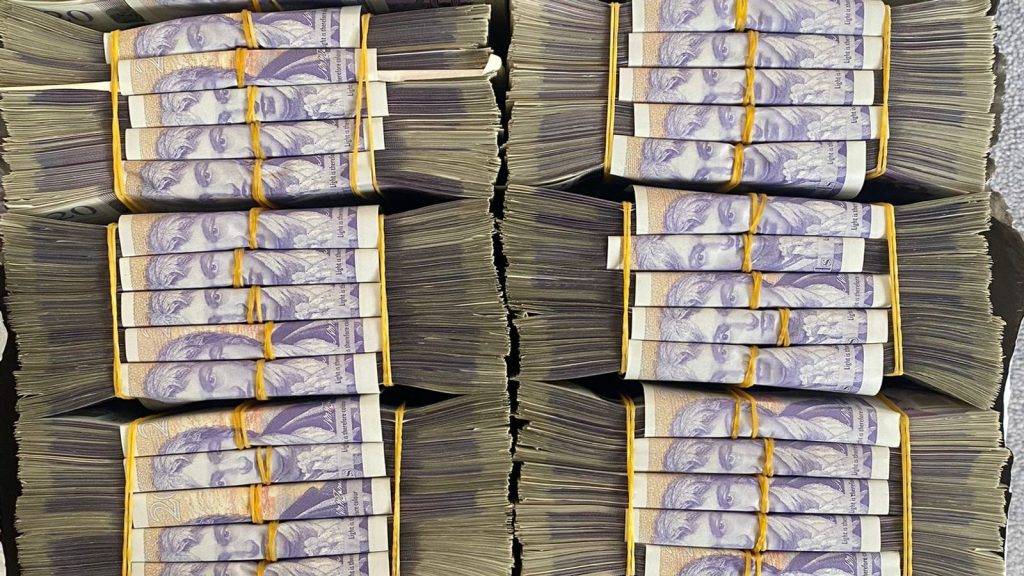Cliff Notes
- Two gang members, Valeriy Popovych and Vitaliy Lutsak, were sentenced to 6.5 years each for laundering £6.63 million by buying and selling vehicles in Ukraine, exploiting demand created by the war.
- The criminal operation involved using illicit cash to purchase vehicles, which were sold in Ukraine and the proceeds converted into cryptocurrency, with over $14 million traced through digital wallets.
- Authorities discovered extensive evidence, including cash seizures and an Excel spreadsheet documenting the money laundering activities, leading to multiple arrests and convictions.
Money laundering gang who exploited Russia-Ukraine war jailed after being caught with £190,000 in cash
Two members of a criminal gang have been jailed for a combined 13 years for laundering millions of pounds by exploiting the war in Ukraine.
The group used criminal money to buy vans and lorries in the UK to sell in Ukraine after the start of the war, before converting their earnings into cryptocurrency.
They exploited the legitimate demand for vehicles in Ukraine, and the lack of regulation around cryptocurrency in Ukraine to launder £6.63m between 2022 and 2023.
Valeriy Popovych, 52, from Sunbury‐on‐Thames, and Vitaliy Lutsak, 43, from Cheshunt, Hertfordshire, will both serve 6.5 years in prison, after a five-week trial.
Popovych’s wife, 42-year-old Oksana Popovych, also from Sunbury‐on‐Thames, is due to be sentenced on 30 May.
They were all found guilty of transferring criminal property – or money laundering – and running an unregistered money service business, following an investigation by the Metropolitan Police’s economic crime team.
At Monday’s sentencing, Justice John Dodd KC told the men: “This clearly was sophisticated offending, carried out over a sustained period.
“I’m satisfied each of you played a leading role in this operation.”
Valeriy Popovych ran an export business, Sprint Commercial Ltd, buying the vehicles in the UK from legitimate traders and selling them in Ukraine. His wife was also employed by the business.
He would purchase the vehicles with criminal cash, before the sale proceeds were deposited in Ukraine in a money service business, or currency exchange, and then converted into cryptocurrency.
Lutsak acted as the money coordinator in the operation, sending Popovych to collect the illegal cash from criminal customers in the UK, which he’d then use to buy the vehicles. Police found more than $14m in cryptocurrency had passed through his ‘cryptowallets’ stored on his computer.
A part of the laundered cash was controlled by a Russian national called Semen Kuksov, who was convicted on 27 October 2023 at Southwark Crown Court, under the National Crime Agency’s (NCA) Operation Destabilise.
Kuksov was sentenced to five years and seven months’ imprisonment at Southwark Crown Court in February 2024.
During the investigation into Popovych and Lutsak, police uncovered a Microsoft Excel spreadsheet proving they laundered £6.63m of cash between August 2022 and June 2023. Popovych to purchase a second house in southwest London for just under £1m.
Acting on intelligence on 28 June 2023, police stopped a vehicle in Twickenham, in which Valeiry Popovych was the passenger. Met officers found more than £60,000 in cash in the vehicle before arresting him at the scene.
Officers then searched his address on Gloucester Road, Feltham, where they recovered £130,000 in cash. This money was seized along with his electronic devices.
The Economic Crime Unit discovered the link with Oksana and Lutsak, who were arrested in their homes on 15 May 2024.
The Met’s economic crime unit worked with partner agencies including the NCA, HM Revenue and Customs and the Financial Conduct Authority to conduct their investigation. It involved assessing complex evidence, including chats, money transactions, CCTV, cryptocurrency wallets and call logs.
Negeen Momtahen, specialist prosecutor for the Crown Prosecution Service, says money laundering isn’t a “victimless crime” and they aim to confiscate the money gained through their criminal activity.


